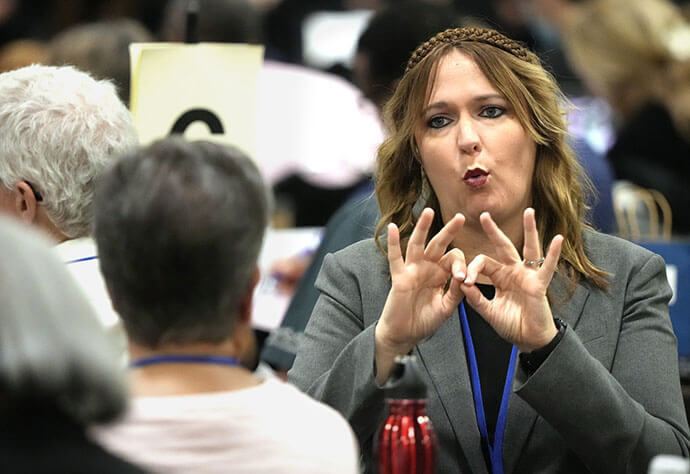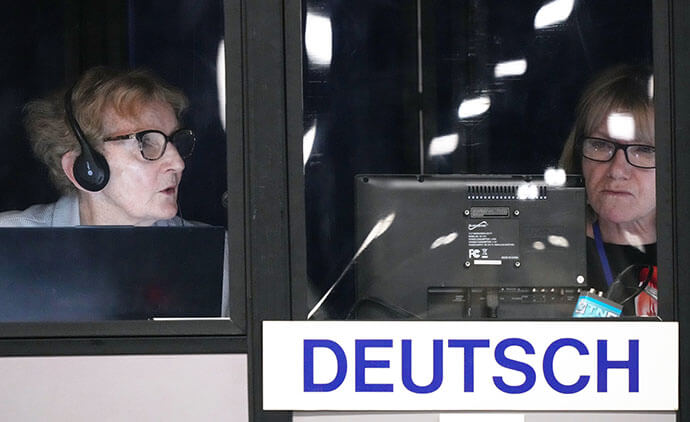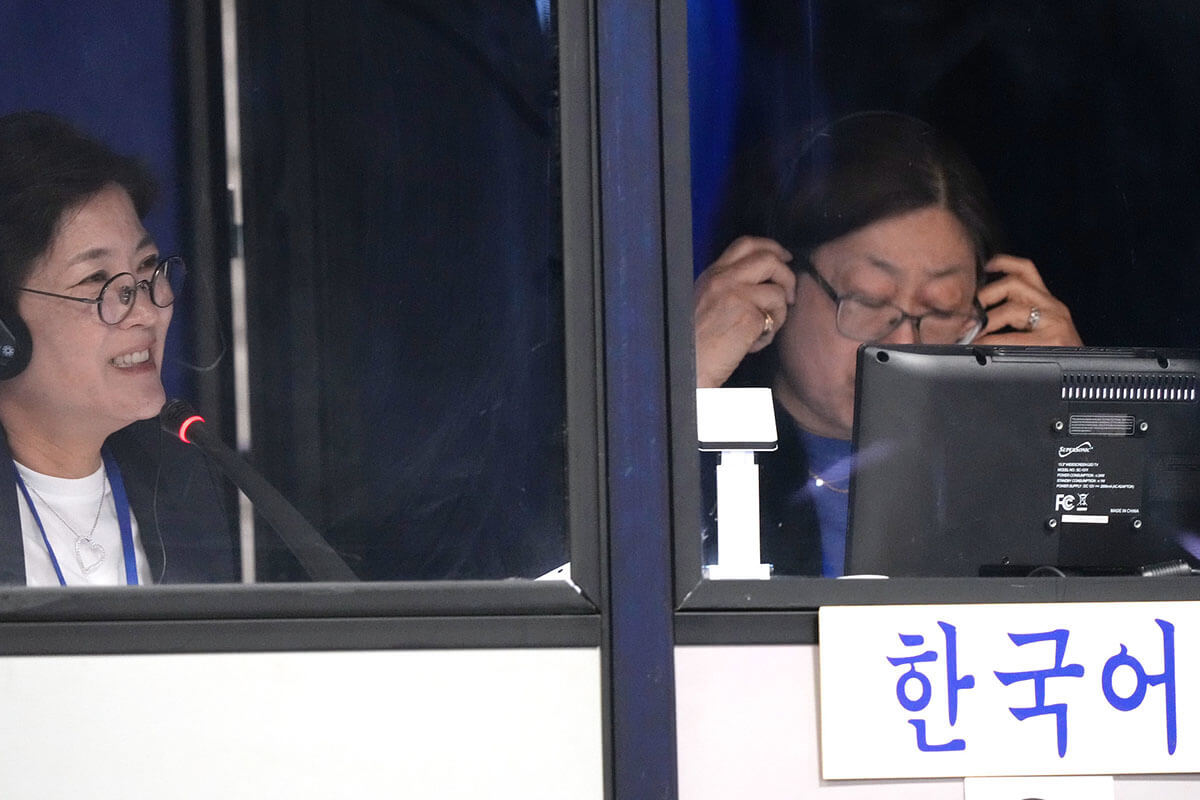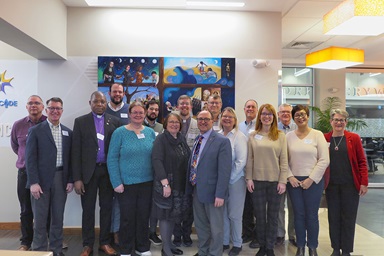Key points:
- Written material translators sometimes work as late as midnight to ensure delegates have their printed Daily Christian Advocate in the morning.
- Over 180 interpreters were enlisted for legislative committee meetings that, at times, had four working groups all requiring translation.
- Translators are vital to transverse language barriers and enable delegates to discuss issues affecting the denomination.
There are more than 760 United Methodist Church delegates from across the globe, gathered April 23-May 3 in Charlotte, North Carolina, to determine the denomination’s future, and many identify with different “international” languages, depending on their nationality.
English, French, Portuguese and Kiswahili speakers dominate the auditorium, and it was up to dedicated translators, numbering about 180 during the first week, to ensure they understood each other to contribute meaningfully to conversations.
In the makeshift Daily Christian Advocate translators’ lounge, three groups of six volunteers diligently translate the daily proceedings’ written material into French, Portuguese and Kiswahili, sometimes working till midnight.
“If we receive the material late, we also work late, so the delegates have their complete material in the morning,” said the Rev. Naftal O.M. Naftal. A pastor serving at Brunswick and Salisbury churches in Missouri, Naftal translates into Portuguese.
Originally from Mozambique, Naftal first joined the pool of translators at General Conference in 2008 in Tampa, Florida.
“This is a gift and one of my favorite things to do,” he explained. “I connect people through language. I love passing on messages and serving God in different capacities.”

Euphresie Lukamba from the Congo serves with the Kiswahili written material translators at General Conference. “Translating is something I do regularly,” she said. “I enjoy working in Charlotte and will definitely join the translation team at the next General Conference.”
For Jesse Kiboko, an academic and immigration advisor from Fargo, North Dakota, the 2020 General Conference is his first time to serve on the Kiswahili desk.
“I volunteer so there is no misunderstanding for delegates from the Congo,” he said. “It is difficult to follow proceedings if they do not understand the languages of the speakers.”

General Conference photos
John Wesley Shungu Umatuku said that translating at General Conference is both “a good experience and a responsibility.”
“We are learning and helping the church in its diversity, so everyone is on the same page,” he said.
Because the Charlotte meeting is his first time to serve at the biggest decision-making body of the denomination, he was initially concerned, since he was not familiar with the gathering.
“I consider translation as a ministry because our God is a God of many languages,” he noted. “This diversity in The UMC is somehow similar to the experience felt on the day of Pentecost. I am grateful to the church for organizing such an opportunity to allow us to serve God according to the gifts that we have. Everyone has a place to serve.”
The Rev. John Hiller of Oklahoma coordinated translations for the DCA: “This is my first time to do this,” he said. “It has been interesting to see the way translators go about their work. Throughout the day, we get material for printing in the next day’s DCA.”

The translators’ role has not gone unnoticed. Karumb Karumb, a veteran delegate from South-West Katanga, said she appreciates the translations that enable her to follow and participate in deliberations.
“I am conversant in French and Swahili and prefer to use the former as my language of choice at the General Conference,” she said. The Charlotte meeting is her sixth time as a delegate.
Donald Reasoner, coordinator of translations at General Conference, said he started putting together the team of interpreters last year.
Subscribe to our
e-newsletter
“I didn’t get some of the delegate information until March,” he said. “I needed it earlier to plan and anticipate language requests for the conference. Some delegates indicated they spoke English but discovered they needed translation to another language once the meetings started.”
Reasoner had the unenviable task of assembling and coordinating more than 180 translators for the first week in Charlotte to ensure delegates had access to a language in which they were conversant. The second week, dominated by plenary sessions, needs 70 interpreters.
“There are 14 legislative committees and up to five languages per committee,” Reasoner said. “We cater for the spoken languages — English, French, Portuguese, Kiswahili, Korean, German, Russian, Tagalog, Spanish and American Sign Language.”
Translators also supported the Council of Bishops and Judicial Council meetings held on the eve of General Conference and even accompany delegates who need medical attention to the local hospital, said Reasoner.
“During the conference,” he admitted, “I get very little sleep and do a lot of running around, making sure we have the required translation equipment. However, I get a lot of appreciation.
“It’s a blessing to help delegates so they can talk and work together for the good of The United Methodist Church. It’s very rewarding.”
Chikwanah is a correspondent for UM News based in Harare, Zimbabwe.
News media contact: Julie Dwyer at (615) 742-5470 or [email protected]. To read more United Methodist news, subscribe to the free Daily or Weekly Digests.




